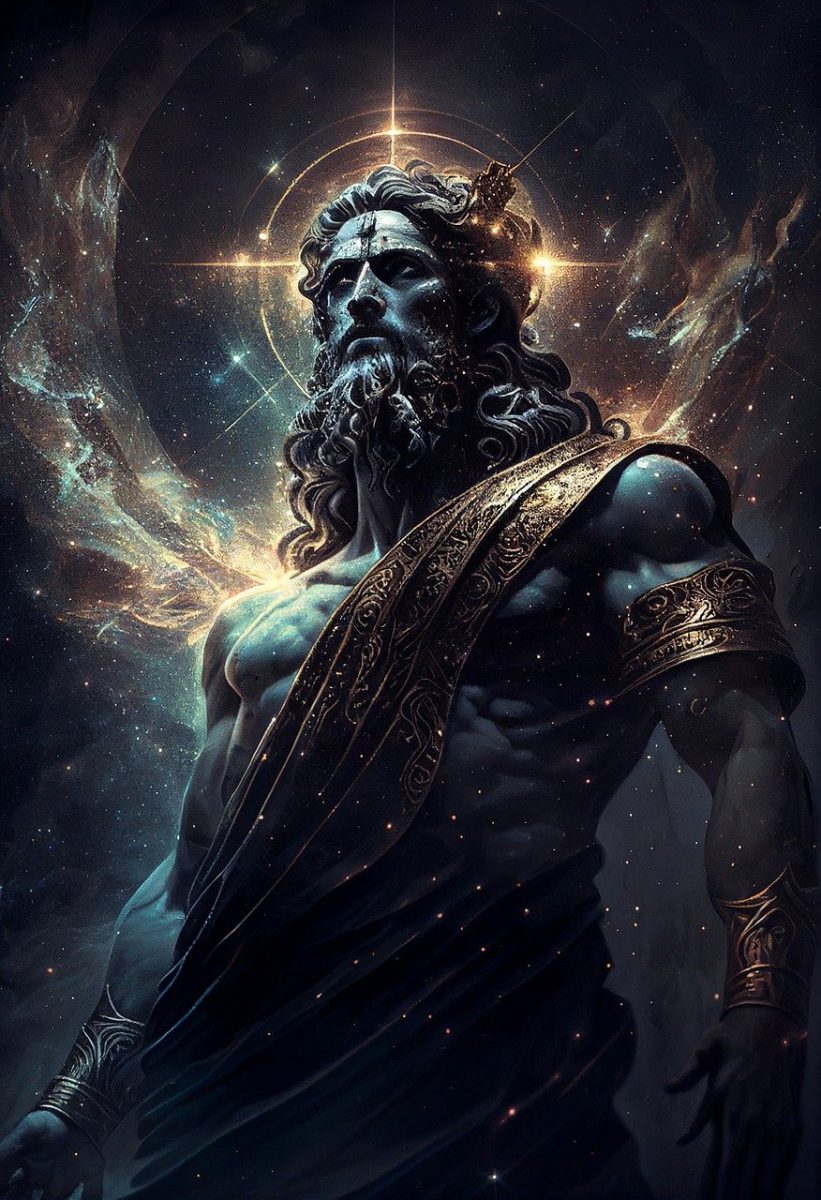Zeus, also known as Zeus Pater or Zeus Olympias, is one of the most well-known and revered gods in Greek mythology. He is often depicted as a powerful and authoritative figure, sitting on his throne on Mount Olympus, the highest peak in Greece. Zeus is the king of all gods and ruler of the heavens, wielding immense power and control over the natural world. According to Greek mythology, Zeus is the son of Cronus and Rhea. Cronus, fearful of being overthrown by his children, swallowed them as soon as they were born. However, Rhea managed to save Zeus by hiding him in a cave on the island of Crete and giving Cronus a stone wrapped in swaddling clothes to swallow instead.
Zeus grew up in secret and, once he reached adulthood, he devised a plan to free his siblings from Cronus’ belly. With the help of his mother, Rhea, Zeus tricked Cronus into regurgitating his siblings, Poseidon, Hades, Hestia, Demeter, and Hera. Together, the six siblings overthrew their father and the Titans, banishing them to the underworld. As the leader of the Olympian gods, Zeus became known as the god of the sky and thunder. He is often depicted holding a lightning bolt, which he uses to create thunderstorms and symbolizes his power over the natural elements. In addition to his role as the king of gods, Zeus is also associated with justice, law, and order.
Zeus is known for his many romantic escapades and affairs with both mortal women and goddesses. He fathered numerous children, some of whom became famous heroes and demigods in Greek mythology. His most famous offspring include Athena, Apollo, Artemis, Hermes, Persephone, Dionysus, Helen of Troy, and Heracles (Hercules). Despite his power and authority, Zeus is also known for his unpredictable and sometimes volatile nature. He could be vengeful and wrathful, punishing those who defied or angered him. At the same time, he was also seen as a protector of justice and fairness, intervening in conflicts and championing the weak.
Zeus played a significant role in many famous Greek myths and legends. For example, he was instrumental in the Trojan War, siding with the Greeks and aiding their victory over the Trojans. He also played a central role in the creation of Pandora, the first woman, and unleashed the Great Flood to punish humanity for its wickedness, sparing only Deucalion and Pyrrha to repopulate the earth. Zeus is a complex and multifaceted figure in Greek mythology. He embodies power, authority, justice, and unpredictability. His role as the king of gods and ruler of the heavens places him at the center of Greek mythology, with numerous tales and legends surrounding his actions and influence. Zeus continues to captivate and inspire readers and scholars alike with his impact on ancient Greek culture and literature.
Zeus is one of the most prominent figures in Greek mythology. As the king of gods and ruler of the heavens, he holds immense power and authority. He is often depicted as wielding thunderbolts and is associated with storms and lightning. Zeus is known for his many offspring, who include gods, goddesses, and heroic figuresZeus was born to the Titans Cronus and Rhea, and he led his siblings in a successful rebellion against their father. After overthrowing the Titans, Zeus and his brothers Poseidon and Hades divided the world among themselves, with Zeus becoming the ruler of the sky and heavens. One aspect of Zeus’ character that stands out is his ability to shape-shift. This allowed him to take on various forms to interact with mortals and pursue his many love affairs. His amorous exploits often resulted in the birth of demi-gods and heroes, adding to his immense family tree.
As a god associated with justice and fairness, Zeus would sometimes intervene in mortal affairs to ensure justice was served. However, he also had a temper and would unleash his wrath upon those who defied or angered him. Despite his unpredictable nature, Zeus was seen as a protector of the weak and the upholder of order. There are numerous myths and stories involving Zeus, ranging from his involvement in the creation of humans to his key role in the Trojan War. His actions and influence are central to Greek mythology, making him one of the most important and intriguing figures in ancient Greek culture.







